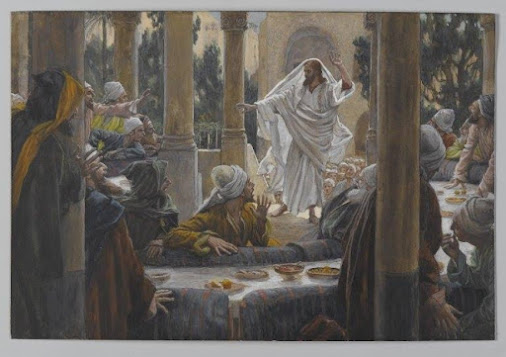(Audio)
"You disregard God’s commandment but cling to human tradition."
He went on to say, "How well you have set aside the commandment of God in order to uphold your tradition!"
We often behave like the Pharisees, clinging to human tradition, going so far as to set aside the commandment of God. This happens when traditions, which may once have had a good, useful, and even noble purpose, have become mere criteria for judgment of ourselves as righteous, and bludgeons with which to condemn others who don't observe them. The desire of the Pharisees to expand purifications beyond the priestly class to bring more involvement to the laity was at least understandable as an impulse that was initially good. But it had metastasized into something else, an elaborate system whereby the Pharisees could show that they were better than others.
“Why do your disciples not follow the tradition of the elders
but instead eat a meal with unclean hands?”
We tend to like these sorts of traditions because they are things we can control without the need for conversion. They are therefore distinct from following law. They can be practiced even while our hearts are far from God. To avoid the risk such traditions pose, we need to understand and to be able to separate the merely human traditions from the Sacred Tradition of the Church. We do have some need for even merely human traditions to keep us tethered, connected, and integrated. But with the merely human we must be flexible. Sacred Tradition, on the other hand, is part of the deposit of faith, which, while can always be better and more clearly understood, can never be set aside.
Therefore, brethren, stand fast, and hold the traditions which ye have been taught, whether by word, or our epistle (see Second Thessalonians 2:15).
Our Scriptures can provide an example. Do we follow the human teaching of only counting sixty-six books as canon, or do we hold to the Sacred Tradition and include all seventy-three? We would clearly have a dilemma if the options were merely set one alongside the other and we were forced to choose arbitrarily. But this was not the way God designed his Church. He gave us the authority of Peter (see Matthew 16:18), his successors, and the bishops in union with them in order to provide a living voice to assure us what is divine revelation and what is merely human accretion over and above that revelation.
In your observance of the commandments of the LORD, your God,
which I enjoin upon you,
you shall not add to what I command you nor subtract from it.
It is of the greatest urgency so that we keep ourselves from the temptation to add or to subtract to the word of God. We are accountable to it, not it to us. If we freely embrace a cafeteria Catholicism, where we can improve on God's revelation with changes that seem good to us, we will change it in such a way as to empty it both of its demands, and, as a consequence also of its power to transform us. We may begin to think that the use of guitars in mass is a problem of greater urgency than service of the poor. A beautiful mass and love of neighbor ought not need to conflict. Yet we will know from our words and actions the actual content of our priorities.
Nothing that enters one from outside can defile that person;
but the things that come out from within are what defile.
We don't want our beliefs to become a mishmash of human and divine tradition in which it is difficult to discern which is which. To that end we must make a conscious attempt to begin well, to welcome God's word actively and consciously as the word of God, above any human word, and to keep it sanctified in our hearts and separated in our minds from the merely human words about that word.
Humbly welcome the word that has been planted in you
and is able to save your souls.
The test of whether we have truly welcomed the word, invited it within, and asked it to make its home in us, is whether or not we become doers of the word. If we only hear the word it passes through us, but does not take up residence. To welcome the word means to invite it to makes its home in both and minds and wills.
We are not abandoned and alone, forced to fend for ourselves with disparate sources of truth and revelation. God has given us his Church precisely to mark off the definitive boundaries of what is contained in revelation and what is not. The Church has no role as innovator. Her task is not to add or subtract. As to doctrine, she merely describes what is the field of play and what is out of bounds. Of all of the things the Church has done to help the laity to be rooted in this essential truth, perhaps nothing is of greater importance than the universal Catechism of the Catholic Church, promulgated in 1992 by Saint John Paul the Great, who described it as "a sure norm for teaching the faith".
When we embrace the truth of revelation we give evidence to the nations of our wisdom. We become people who seem to know a secret set of rules or blueprints that help us live as we are meant to live. Other people may observe a coherence between our lifestyles and reality which they don't see in themselves or understand, and may desire to ask us about it. For us to live otherwise is folly. If we ignore the spiritual laws of God they will nevertheless continue to be true. We ignore the law of gravity and other scientific laws at our peril. Even more so, then, the laws of God.

No comments:
Post a Comment